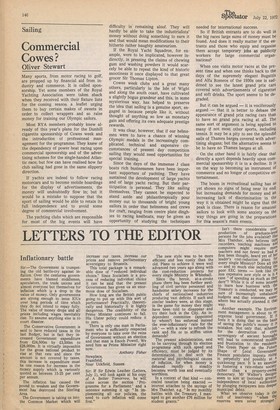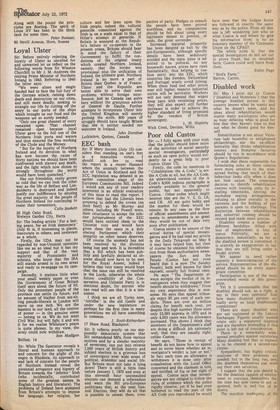LETTERS TO THE EDITOR
Inflationary battle
Sir:—The Government is trumpeting the old battle-cry against inflation. Over the centuries governments have blamed middlemen, speculators, the trade unions and almost everyone but themselves for inflation which is a drop in the value of money. Only governments are strong enough to issue IOUs over long periods of time Which they do not intend to repay fully. The value of money drops and all prices including wages inevitably rise. To assume anything else is to court disaster.
The Conservative Government is said to have reduced taxes in the last Budget, but in fact they increased Government expenditure from £24,500m by £3,500m to £28,000m. It is virtually impossible for the gross national product to rise at that rate and since the amount is not covered by taxes, this increase in expenditure must be one reason for increase in the money supply which is variously quoted as between 15-25 per cent per annum.
The inflation has caused the pound to weaken and the Government has destroyed the Sterling Area.
The Government is taking us into the Common Market which will increase our taxes, increase our prices and remove parliamentary sovereignty to Brussels. This total package is a remarkable dose of "reduced individual choice." Since Socialism is a process of reducing individual choice it can be said that the present Government has given us an enormous dose of Socialism.
How long are the British public going to put up with this sort of performance? Practically, theoretically and historically it is highly dangerous. The credibility of the Prime Minister continues to fall. His Ulster policy could reduce it to zero.
There is only one man in Parliament who is sufficiently respected by everyone to take over the reins of Government without an election and that man is Enoch Powell. We need him as Prime Miniscter right now.
Anthony Fisher Newplace,
Framfield, Near Uckfield, Sussex.
Sir: If Sir Edwin Leather (Letters, July 1), will look again at his copy of A Better Tomorrow, he will come across the section ' Programme for a Parliament' and a sentence summing it up: "In implementing all our policies, the need to curb inflation will come first." The new style was to be more efficient and less costly than the old. Plans to achieve it were well advanced two years ago along with the cost-reduction projects for every single Ministry in Whitehall.
Since the heroic, at-a-stroke phase there has been further swelling of civil service personnel and handsome salary increases for the chiefs of nationalised industries producing vast deficits. If such and similar leaders were, at this stage, in the game for money they might have been told to disappear and try their luck in the City. An independent committee (appointed by whom?) has enforced instead the ever-inflationary 'rate for the job' — with a view to refresh the rank and file or to stiffen union demands?
The present administration, said to be carrying through its election programme with such speed and efficiency, must be judged by its determination to deal with the material and psychological causes of inflation, for when money is debased rapidly it steadily becomes worth less and eventually worthless.
In a context of that kind — concealed taxation being exacted — interest attaches to the sayings of Mrs Thatcher, e.g. "In my monthly battles with the Treasury, I managed to get another £76 million for student grants."
Isn't there considerable over; production of graduate-levei persons for the jobs available? 1-iss Mrs Thatcher, who believes taPAe recorders, teaching machines an' computers might require more teachers and not fewer as had at first been thought, heard yet of he; leader's cost-reduction plans fri.' every single Ministry? Does all thIS and so much else including the poor EEC terms — look like the less expensive new style or is it 0 case "of spending as much as they dare"? While it is of some interes' to learn how business with the Treasury is conducted, we may ne, sure of increasingly unbalance° budgets and that someone, some where has actually planned it that way. Another example. The Environment .management is about to re." organise local government. If !t,. feels it is doing that on the basi, of saving the public's money it ls mistaken. Not only that, scherr109 for the destruction of civic sovereignty of ancient borough,s will lead to concentrated muddle and frustration to the residents. The Green Paper on the Future Shape of Local Governme,rn Finance postulates imposts rising in perpetuity and possibly at, 0 quickening pace. It is an exercise in fostering a rate-rebate societY rather than a property-ovong,, democracy. Mr Walker's design' seem to aim at (notional) greater independence of local authorities by plunging ratepayers into deeper municipal debts. What we observe today is the cult of insolvency "when ti,, reserves were never stronger. Ratator July 22, 1972
Along with the pound the principles are floating. The spirit of Louis XV has been in the think tank for some time.
Peter Ratazzi, 90 Nevi11 Avenue, Hove, Sussex











































 Previous page
Previous page